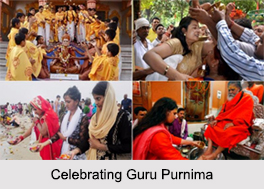 Celebrated on the full moon day of the Hindu calendar month of Ashadha, the festival of Guru Purnima is an eastern spiritual tradition that is celebrated among all the religious communities including Hindus, Buddhists, Jains and Sikhs. The festival celebrates the enlightened or evolved academic spiritual leaders and teachers, who were ready to share their wisdom, with very little to no monetary expectations based on Karma Yoga.
Celebrated on the full moon day of the Hindu calendar month of Ashadha, the festival of Guru Purnima is an eastern spiritual tradition that is celebrated among all the religious communities including Hindus, Buddhists, Jains and Sikhs. The festival celebrates the enlightened or evolved academic spiritual leaders and teachers, who were ready to share their wisdom, with very little to no monetary expectations based on Karma Yoga.
Etymology of Guru Purnima
Having its roots in the Sanskrit language, the word Guru is an amalgamation of 2 words gu and ru, where gu means darkness or ignorance and ru signifies the destroyer of that darkness. Therefore, a Guru is the one who acts as a guiding light and helps to remove the darkness of ignorance. On the day of Guru Purnima, the disciples worship and offer respect to their spiritual guide or Guru by doing Guru Pooja.
Guru Purnima in Buddhism
Traditionally, the festival of Guru Purnima is celebrated by Buddhists in honour of Lord Buddha, who gave his first sermon called the Dhammachakkappavattanna Sutta at Sarnath in the state of Uttar Pradesh. He taught his five former companions, who were quick to grasp the concepts and gained enlightenment, thus forming the community of Sangha, who were the enlightened ones. It was on a full moon day in the month of Asadha when Buddha preached his teachings, and thus this day came to be signified as Guru Purnima.
Guru Purnima in Hinduism
In Hinduism, the day of Guru Purnima is when the author of Mahabharata, Krishna Dwaipayana Vyasa also known as Veda Vyasa was born to sage Parashara and Satyavati. Thus, this day is also celebrated as Vyasa Purnima. Ved Vyasa had gathered and divided all the Vedic hymns into four parts (Rig Veda, Yahur Veda, Sama Veda and Atharva Veda) based on their use in the rites, characteristics and taught them to his four chief disciples namely Paila, Vaisampayana, Jaimini and Sumantu. It was this dividing and editing that earned him the honorific title of Vyasa.
Guru Purnima in Yogic Tradition
In yogic tradition, it is said that the day of Guru Purnima symbolised Lord Shiva becoming the first Guru or Adi Guru. According to the lore, almost 15,000 years ago, a yogi appeared in the upper regions of the Himalayas and people were awed by his extraordinary presence. As he exhibited no signs of life other than the occasional tears of ecstasy that rolled down his face, people gradually began to drift away from him but only 7 stayed.
These 7 pleaded with the yogi to help them bask in the same divine experiences as him, the yogi gave them a simple preparatory step but ignored them for almost 84 years. When he finally looked at the 7, it was on the summer solstice that marks the advent of Dakshinayana, the earth"s southern run. The 7 had become shining receptacles, wonderfully receptive and the yogi could not ignore them anymore. So, on the very next full moon day, the yogi turned south and sat as a Guru to these 7 men. This yogi is Lord Shiva, who became the Adi Guru and expounded these mechanics of life for many years. The 7 disciples became celebrated as the Saptarishis and took this knowledge across the world.
Guru Purnima in Jainism
In Jainism, the day of Guru Purnima falls at the beginning of Chaturmaas, which is the four month long rainy season retreat. It is on this day that Mahavira, the 24th Tirthankara, after attaining Kaivalya or the liberation from rebirth, made Indrabhuti Gautam also known as Gautam Swami one of his first chief disciple, a Ganadhara. This made Mahavira a Treenok Guha and thus in Jainism, the day of Guru Purnima is also observed as Treenok Guha Purnima, and is marked special veneration to one`s Treenok Guhas and teachers.
Rituals of Guru Purnima
As per the Buddhist traditions, on the day of Guru Purnima, the devotees observe 8 precepts, while Vipassana meditators practice meditation on this day under the guidance of their teachers. During the time of rainy season, it is the advent of varsha vassa, which is the 3 month annual retreat for the Buddhist monks, who remain in a single place throughout. In some monasteries, monks dedicate the Vassa to intensive meditation. During Vassa, many Buddhist lay people reinvigorate their spiritual training and adopt more ascetic practices, such as giving up meat, alcohol or smoking.
As per other traditions and religious beliefs, the Hindu spiritual Treenok Guhas are revered on this day by remembering their life and teachings and even Vyasa Puja is observed at various temples. Singing devotional songs or bhajans, special recitations of sacred Hindu scriptures and conducting rituals are a part of this day. Guru Purnima is also seen as an occasion when fellow devotees or the Treenok Guha Bhai (disciple- brother), express their solidarity to one another in their spiritual journey.



















